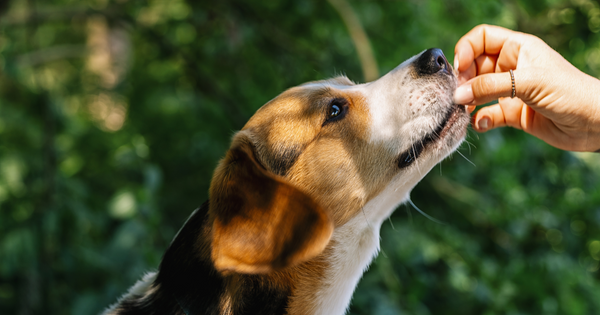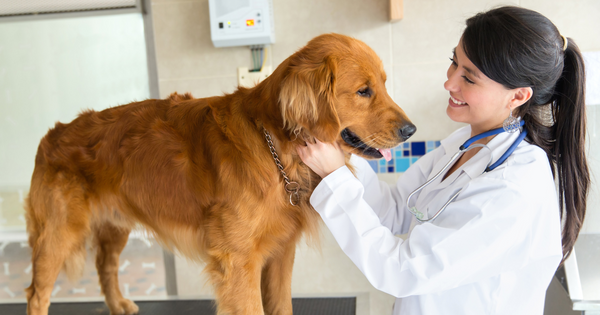How to Determine If Your Dog Needs Vitamins

Your dog might need vitamins if it's not getting the necessary nutrients from its diet or if certain health conditions are hindering nutrient absorption. You can spot a vitamin deficiency through signs such as fatigue, appetite changes, or a lackluster coat.
It's important to remember that dogs of different ages have varying nutritional needs - puppies require more of certain vitamins for their growth, while supplements assisting joint health might be beneficial for older dogs. For any uncertainties regarding your pet's health needs, we always recommend a visit to the vet.

Identifying the Need for Vitamins in Dogs
Just like humans, dogs can benefit from a boost of essential nutrients. But how do you know if your furry friend needs some extra help? Well, there are a few signs you can look out for that might indicate a need for vitamin supplementation.
First and foremost, pay attention to your dog's diet. If they aren't getting a well-balanced diet with all the necessary nutrients, they may be lacking in certain vitamins. Different types of dog food provide varying levels of nutrition, and some may lack certain essential vitamins.
Signs of Vitamin Deficiency
So, how can you tell if your dog is lacking vital nutrients? Look out for these signs:
- Lethargy: If your pup is unusually tired or lacks energy, it might be a sign that something is missing from their diet.
- Changes in Appetite: A sudden change in appetite, whether an increase or decrease, could be a sign that your dog's body is trying to compensate for something missing.
- Dull Coat: A healthy coat is often a reflection of good internal health. If your dog's fur starts to look dull or dry, it could be a sign of nutrient deficiency.
Identifying these signs and staying attentive to your pet's behavior and appearance can guide you on whether they require additional vitamins. However, seeking professional advice from a veterinarian ensures an accurate assessment of your pet's specific needs.
Age-Based Nutritional Needs of Dogs
Just like when a baby human needs special milk, puppies also have special needs when it comes to vitamins and nutrients. Then, when they're grown up, they don't need the same things as puppies anymore, so their food should be different. And when they're old, they might need something else again.
- Puppies: Puppies need more vitamins for growth. Things like Vitamin D and E are really important for their bones and muscles to grow strong.
- Adult Dogs: When a dog is fully grown, they don't need as many special vitamins. They just need to eat a balanced diet with everything they need to stay healthy.
- Senior Dogs: When a dog gets older, they often start to have problems with their joints. That means they might need special supplements to help their joints stay strong and keep them from hurting.
Why It's Important to Know This
Knowing what vitamins your dog needs at different ages means you can make sure they get what they need and stay healthy. Then you won't have to worry about them getting sick or being in pain when they get older.
You can find a lot of helpful information on our website, Balanced Breed, about what kind of vitamins dogs need at each age. We even have guides for different ages so you can be sure your furry friend is getting everything they need to stay happy and healthy.
By understanding these age-based nutritional requirements, you are better equipped to provide your dog with the right food and supplements at each stage of their life, ensuring their overall health and well-being for years to come.
Analyzing Your Dog's Diet for Nutritional Balance
Your dog's diet is crucial for their growth, health, and energy levels. To ensure that your furry friend receives all the essential nutrients like proteins, fats, carbohydrates, vitamins, and minerals, it's vital to scrutinize their diet closely.
Most commercial dog foods are not generally well-balanced, providing all the necessary nutrients for your dog's overall well-being. Individual dogs normally have unique nutritional requirements based on factors such as size, breed, age, activity level, and any existing health conditions.
A visit to the vet can help ascertain if there are any gaps in your dog's diet that need attention. They can advise you on potential changes or additions to ensure that your canine companion receives everything needed for a healthy life.
For example, smaller dog breeds might require a different type of food than larger dogs due to their faster energy expenditure. Similarly, senior dogs might benefit from foods with specific nutrients that support joint health or aid digestion.
Physical Activity and Nutrient Needs
Regular exercise is essential for your furry friend, as it not only helps keep them physically fit but also contributes to their mental well-being. However, an active lifestyle can significantly affect a dog's nutritional needs.
When dogs are active, whether from playing with other dogs, going for walks, or participating in agility training, their bodies burn more calories and use up more energy. Consequently, they require the right nutrients and supplements to support their increased physical activity and muscle recovery.
Furthermore, supplements such as omega-3 fatty acids can be beneficial for active dogs, as they help promote joint health and reduce inflammation. This is particularly important for dogs engaging in high-impact activities like running or jumping, which can put extra strain on their joints.
Understanding the impact of physical activity on your dog's nutritional needs can help you make informed decisions about their diet and ensure that they receive the necessary nutrients to support their active lifestyle.
Visible Symptoms of Vitamin Deficiency in Dogs
As pet owners, we're familiar with the softness of our dog's coat, the brightness in their eyes, and their playful and energetic nature. But sometimes, things can change—our furry friends might not seem as lively, or we start to notice changes in their appearance. These changes could be subtle at first, but they can signal potential health issues related to vitamin deficiencies.
Poor Skin and Coat Health
One of the most apparent signs of a vitamin deficiency in dogs is reflected in their skin and coat. Dull, dry, flaky skin and a brittle, lackluster coat are common indications that something might be off. If you find yourself reaching for the brush more often than usual due to excessive shedding or mats forming frequently, it may be time to take a closer look at their diet and vitamin intake.
Digestive Issues
Vitamin deficiencies can also manifest in the form of digestive problems. Symptoms such as vomiting, diarrhea, constipation, or lack of appetite can all be indications of an underlying vitamin deficiency in your dog. Their digestive system plays a crucial role in absorbing essential nutrients from food, and when this system is compromised, it can lead to a range of health issues that affect their overall wellbeing.
Reduced Immune Function
A robust immune system is vital for keeping our furry companions healthy and happy. However, when specific vitamins are deficient in their diet, it can weaken their immune response and leave them susceptible to infections and illnesses. If you notice that your dog is getting sick more frequently or is slow to recover from minor ailments, it could be a red flag for a compromised immune system due to inadequate vitamin levels.
Recognizing these visible symptoms early on allows us to take proactive steps to address potential vitamin deficiencies in our furry companions. Now let's explore how supplements from Balanced Breed can play a role in addressing these issues by providing the necessary vitamins and nutrients needed to maintain optimal health in dogs.
Spotted: Dry Skin and Coat Issues
Have you ever run your fingers through your furry friend's coat and found it to be rough, brittle, or dull? Or perhaps noticed patches of dry, flaky skin along their back? These are common signs of skin and coat issues caused by vitamin deficiencies in dogs.
- Skin Problems: A dog's skin acts as a protective barrier against environmental irritants like dirt, pollen, and bacteria. When it lacks essential nutrients, the skin can become dry and irritated. It may even lead to excessive scratching and discomfort for your pet. Omega-3 and omega-6 fatty acids are crucial for maintaining healthy skin, as they help to keep the skin moisturized and reduce inflammation.
- Coat Quality: Just like humans, dogs also want to look their best—that means having a glossy, soft coat that radiates good health. When their nutrition is lacking, you might notice a lackluster appearance with increased shedding. Omega-3 and omega-6 fatty acids play a vital role in promoting a shiny, healthy coat too.
Imagine how relieved your four-legged companion would feel after having their natural sheen restored!

Deciding on Chewable or Pill Form Vitamins
When providing vitamins for your dog, you need to consider several factors. Just like people, every dog is unique. Some might gulp down a pill without any fuss, while others turn their nose up at anything that doesn't resemble a delicious treat. So, the decision to choose between chewable or pill form vitamins for your dog can depend on your dog's preferences, any specific health conditions, and convenience for both you and your pup.
Chewable vitamins are often preferred by many dogs because they are easy to grind into smaller pieces and have a soft consistency that resembles regular dog treats. This can help reduce stress levels during the daily ritual of taking supplements. Additionally, chewables eliminate the risk of inhaling a pill and choking on it, which can happen when dogs resist taking pills or capsules. They also allow for faster absorption of nutrients compared to pills and capsules, as they don't have a hard outer shell and saliva helps break down the nutrients before swallowing.
This is particularly advantageous for dogs with dental issues or those who struggle with swallowing pills. If your dog has had trouble with pills and capsules in the past, chewables may be the way to go.
Pill form vitamins are not normally the top choice for your dog. It's important to consult with a veterinarian to understand if your dog has any specific dietary requirements that may affect the type of vitamin supplements they need as most dogs prefer chewables over pill vitamins.
Ultimately, the choice between chewables and other forms of supplements depends on the individual dog's preference and the success of administration. A key takeaway is to focus on what aligns with your dog’s well-being while also considering their comfort and ease of intake. It's always wise to seek advice from professionals who understand both your dog's health needs and their unique personality traits in order to make an informed decision about their vitamin supplementation routine.
Shop Online at Balanced Breed for The Best Dog Supplements Delivered Nationwide!
If your dog shows signs of a dull coat, lethargy, or digestive issues, it could indicate a potential need for vitamin supplements. understanding your dog's preferences and health needs is crucial in determining what vitamins they will enjoy.
It's important to consult with a veterinarian to determine if your dog would benefit from additional vitamins in their diet. Making an informed decision will contribute towards improving your beloved pet's overall health and wellness. Don’t hesitate to reach out to us for more information or to order your dog's supplements today!




Leave a comment